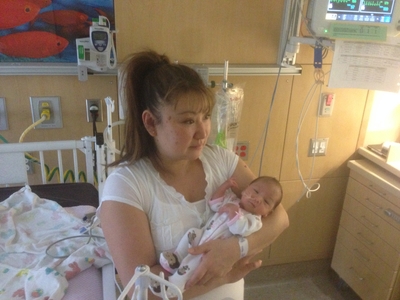
Expectant parents usually dream of their newborn as a chubby-cheeked, healthy peanut swaddled in a soft blanket. For families whose journeys begin in a neonatal intensive care unit (NICU), their reality can feel very different.
With tubes, wires and machines keeping their babies alive, NICU parents may find their new experience full of conflicting emotions: from guilt to gratitude, from fear to friend-seeking. "There are so many added stressors for families with babies born early or with complications, so many unknowns,” says Stephanie Gillis, a registered nurse in Overlake Medical Center’s NICU.

According to the March of Dimes, 9.6 percent of babies born in the United States in 2016 were pre-term, which is defined as earlier than 37 weeks of gestation. Washington state has a pre-term birth rate of 8.1 percent, which is among the lowest in the nation. Still, it’s never easy to leave your newborn in the hospital.
Because the bonds that develop between NICU families and their doctors and nurses can be so strong, Gillis organizes an annual NICU reunion at Overlake.
“It’s so special to see the parents bring in their children and be so proud of how far their babies have come; they are so thankful. It’s very heartwarming,” says Gillis. This year’s event on Sept. 10 drew about 250 people with NICU “graduates” ranging in age from a few months to teenagers.
For parents who are just embarking on their own NICU journeys, here are five tips from Gillis and other NICU alumni.
Take care of your own health. Sometimes, mothers whose babies are born early are coping with health challenges of their own. Larisa Barthe of Bellevue had a history of high blood pressure that required attention even after her daughter Alexis was born at 33 weeks. The family spent about seven weeks in Overlake’s NICU.
“As hard as it was, I learned to let go and let the nurses take care of Alexis,” says Barthe. “They were caring and reassured me that I had to get myself strong and healthy for taking care of my baby after she came home.”
Michelle Huskamp of Monroe, whose daughter Dara spent nine days in the NICU, agrees. “Sleep as much as you can while you have the chance!” she says. “If you have to pump that’s one thing, but if it’s just a diaper change, let the nurses do it because you’re going to be awake for months.”
Manage your relationships. For the Barthe family, dad Patrick was on point for communications. He built a website to post updates for family and friends to view. “I was pumping my breast milk every two hours; I didn’t have time to do any more than sometimes text people,” says Barthe. This is where social media pages and websites like CaringBridge can feel like a life-saver.
Gillis also recommends that NICU families connect with each other for support. “A lot of your friends and family may not be understanding what you are going through so it’s nice to build friendships with people who really understand,” she says.
Personalize your experience. Spending all day, every day with her baby Zaria in the NICU for 21 days, Hiedi Popochock says her mood improved after decorating Zaria's room with photos — especially of the baby's 4-year old sister and 6-year old brother. “I needed to see items that made me feel even more at home,” she says. “It made the whole stay so much better for me.”
If swag helps you embrace the situation, there are even websites that feature preemie gifts for yourself or loved ones who are rooting for you.
Celebrate your baby’s milestones. “We try to focus on the positive,” says Gillis. “Sometimes there is a plateau in the baby’s development, or maybe they even slip back a little, so it’s really important to celebrate when they make progress.” Whether it’s giving out “pound cards” when babies gain weight, or celebrating a preemie taking a full bottle or coming off oxygen, recognition of each little step can mean a big boost to a weary parent’s morale.
Ask and advocate. Many NICU parents get to know their babies quickly. So just as you will want to do when your kids are older, advocate for them now. The nurses are highly experienced and trained, but as Gillis says, "Parents are the experts on their baby. It might be a different nurse that is caring for you on a certain day. Parents should have confidence to speak up if something seems off."
Shayna Myers of Seattle suffers from asthma, so when her son Theolonious was having breathing issues of his own, she suggested to the providers that they find a way to safely prop him up. Sure enough, it improved his situation.
Lastly, ask questions! Gillis recommends writing down a list so that when providers round each day, you won't accidentally forget. This is a stressful time, but it won’t last forever. "It's hard but I remind parents that most of our babies do go home by their due date," says Gillis.











